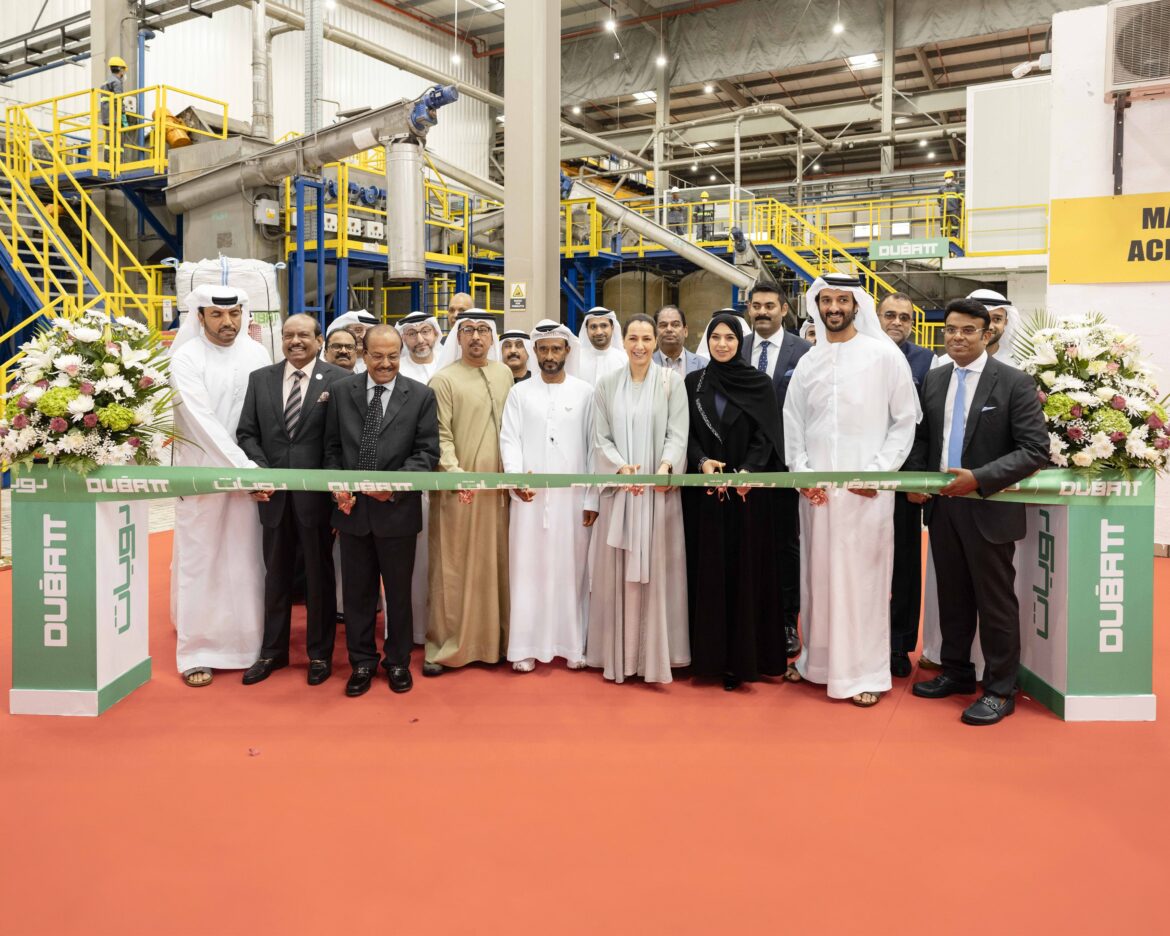Dubatt Battery Recycling’s fully integrated battery recycling plant has been formally inaugurated at Dubai Industrial City, part of TECOM Group PJSC.
Dubatt’s plant is equipped with advanced battery breaking, separating, smelting, and refining technologies to safely extract hazardous waste from used lead acid batteries, recycling up to 80 per cent of battery waste produced in the UAE to manufacture lead ingots.
The ingots manufactured at Dubatt’s plant, the first of its kind in the UAE, will be used to produce new batteries. Further, battery products manufactured at the end of the production cycle will be sold in the UAE and exported across the GCC, Europe, and the Far East, supporting the Make it in the Emirates initiative to strengthen the supply chain for locally manufactured products.
It was shared that the factory, which features a built-up area of 65,000 sq.ft., is aligned with the goals of the UAE Industrial Decarbonisation Roadmap, the UAE Circular Economy Policy 2031, and the Dubai Integrated Waste Management Strategy 2041.
The plant was inaugurated in the presence of His Excellency Abdulla bin Touq Al Marri, Cabinet Member and Minister of Economy; Her Excellency Dr Amna Al Dahak, Cabinet Member and Minister of Climate Change and Environment; Her Excellency Mariam bint Mohammed Saeed Hareb Almheiri, Head of the International Affairs Office at the Presidential Court; and His Excellency Omar Al Suwaidi, Undersecretary of the Ministry Industry and Advanced Technology.
Also in attendance were Eng. Dawood Al-Hajri, Director-General of Dubai Municipality; Mohammed Shael AlSaadi, CEO of Dubai Corporation for Consumer Protection & Fair Trade (CCPFT); Mohamed Sharaf, COO of Investment Attraction at Dubai DET; Padmashri Dr M.A. Yousuff Ali, Chairman and Managing Director of Lulu Group International; and Shri PK Kunchalikkutty, Member of Legislative Assembly and Former Minister of Industries, Government of Kerala.
Dubatt also signed a musataha agreement during the inauguration ceremony to expand the plant, raising its total investment at Dubai Industrial City to AED 216 million.
Speaking about this, His Excellency Abdulla bin Touq Al Marri, Minister of Economy, said: “The circular economy constitutes one of the basic pillars that support the sustainable growth of our national economy in accordance with the vision and directives of our wise leadership. It is a key focus area in the government’s efforts, in partnership with the private sector, to consolidate the country’s position as a global hub for the new economy in line with the goals of the ‘We the UAE 2031’ vision.”
Adding: “The opening of the Dubatt factory, with its advanced technology in the field of battery recycling, is an important step forward in support of the goals of the circular economy agenda and emphasises the pivotal role that the manufacturing sector plays in achieving them. It also aligns with the “valorisation of industrial waste” policy, which was recently approved by the Council of Ministers with the aim of encouraging the reuse of industrial waste. The move confirms the policy of integrated management of recyclable materials as one of the efforts that drives the UAE’s shift towards a circular economy model.”
Meanwhile, Her Excellency Dr Amna bint Abdullah Al Dahak, Minister of Climate Change and Environment, commented: “Dubatt Battery Recycling’s unveiling of a new integrated battery recycling plant is an example of the decisive action being taken in the UAE to protect its communities from the impact of climate change. UAE Circular Economy Policy 2031, launched in 2021, commits to diverting 75% of waste from landfill, and pledges to act on controlling movement of hazardous waste. The steps Dubatt Battery Recycling is taking today will make a huge difference to the UAE and I hope other businesses are inspired by their determination. We need a widespread regenerative approach to resource management, moving away from a ‘take, make, use, dispose’ cycle; we must work towards consumption and production operating sustainably within environmental limits, and we must work together to achieve our goals.”
The plant’s planned expansion, spanning 50,000 sq.ft. of built-up area, is expected to raise Dubatt’s turnover to AED 200 million.
Upon completion, the AED 96 million expansion will raise the factory’s lead acid battery recycling capacity to 75,000 metric tonnes (MT) a year, in addition to introducing dedicated lines for lead billets, wires and lead shots, and a grinding, and granulation line for 3,600 MT of battery plastics, 5,000 MT of lithium batteries, and 7,000 MT of e-waste.



